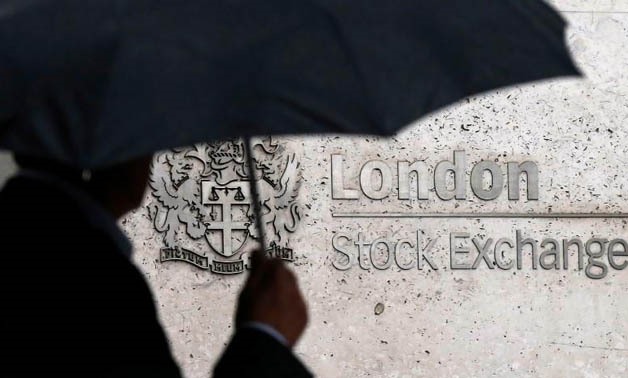
FILE PHOTO: A man shelters under an umbrella as he walks past the London Stock Exchange in London, Britain August 24, 2015.
Suzanne Plunkett/File Photo
LONDON - 15 August 2017: Shares rose on Tuesday, while the Japanese yen, Swiss franc and gold all dropped after North Korea's leader signaled he would delay plans to fire a missile towards Guam, easing tensions and prompting investors to buy riskier assets.
European shares followed Asian bourses higher, having already risen late on Monday after U.S. officials played down prospects of the standoff between North Korea and the United States leading to conflict.
The pan-European STOXX 600 index rose 0.1 percent, adding to Monday's 1.1 percent gains.
North Korea's leader Kim Jong Un received a report from his army on its plans to fire missiles towards the U.S. Pacific territory of Guam and said he would watch the actions of the United States for a while longer before making a decision, the North's official news agency said on Tuesday.
"There is a more relaxed attitude being taken towards the Korean situation in markets. With the report North Korea has put its plans on hold, there is a sense of stepping back from the brink," Rabobank analyst Lyn Graham-Taylor said.
MSCI's broadest index of Asia-Pacific shares outside Japan .MIAPJ0000PUS was 0.1 percent higher in afternoon trade, with Australia up 0.5 percent. South Korea's markets were closed for a holiday.
Japan's Nikkei stock index .N225 closed up 1.1 percent, boosted by the weaker yen, a day after skidding 1 percent to its lowest since early May.
U.S. stocks futures were higher, indicating Wall Street would open higher later in the day ESc1 1YMc1 NQc1.
On Monday the S&P 500 .SPX rose 1.0 percent, led by technology stocks .SPLRCT, in its biggest daily percentage rise since April.
Assets that generally do well in time of market or geopolitical turbulence were among fallers on Tuesday.
The yen, which tends to gain on expectations Japanese investors will repatriate assets in a crisis, fell 0.6 percent to 110.32 per dollar.
"We have North Korea saying they will wait, and Trump not saying anything at all, compared to his past promise of 'fire and fury,'" said Mitsuo Imaizumi, chief FX strategist at Daiwa Securities.
"That added up to good news for the dollar, bad news for the yen," he said.
The Swiss franc, which gained 1.1 percent on Aug. 9 as the war of words over the Korean peninsula intensified, fell 0.2 percent to 0.9736 per dollar. This followed a 1.1 percent fall on Monday.
The euro was down 0.4 percent at $1.1733, helping push the dollar index .DXY, which measures the greenback against a basket of currencies, up 0.4 percent.
The dollar was also helped by comments from New York Federal Reserve President William Dudley, who told the Associated Press he would favor a third increase in Fed interest rates this year if the economy developed as he expected..
In debt markets, yields on low-risk German and U.S. government bonds rose.
German 10-year yields DE10YT=TWEB, the benchmark for euro zone borrowing costs, rose 1.7 basis points to 0.42 percent, having fallen to as low as 0.38 percent on Friday.
U.S. 10-year Treasury yields US10YT=RR rose 3 bps to 2.47 percent, up from a six-week low of 2.18 percent touched on Friday.
Gold, viewed as a safe haven for investors in troubled times, fell 0.6 percent to $1,274 an ounce.
Oil prices steadied somewhat after falling more than 2.5 percent on Monday to its lowest in about three weeks on the strength of the dollar and reduced refining in China.
Brent crude LCOc1, the international benchmark, was last down 2 cents at $50.71 a barrel.


Comments
Leave a Comment